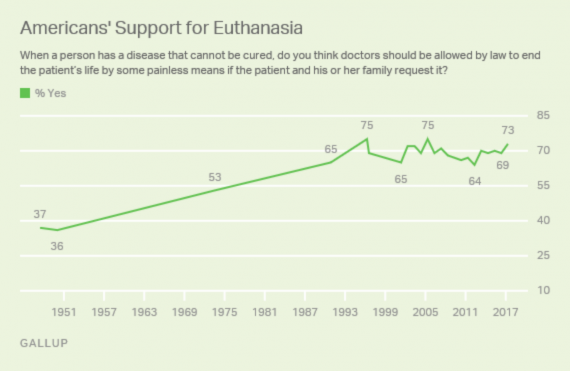Hawaii Legalizes Physician-Assisted Suicide
Late last week, Hawaii became the seventh state and eighth major American jurisdiction to legalize assisted suicide.
Last week, Hawaii became the sixth state, and seventh major American jurisdiction, to legalize medically assisted suicide for terminally ill patients:
With the governor’s signature on Thursday, Hawaii has given terminally ill patients the option to decide when they want to die.
The new law, known as the Our Care, Our Choice Act, will make Hawaii the seventh state in the U.S. and the eighth jurisdiction to legalize physician-assisted suicides. The law takes effect Jan. 1.
It will allow patients in Hawaii to request medication from their physicians that would end their lives. Patients eligible for this option, which has come to be known as “dying with dignity,” must be 18 or older and have less than six months to live.
“It might not be for everyone,” Gov. David Ige (D) said during the signing.
“I do know that even within my own family there’s different opinions about whether there should be an option or not … but we know that we have got to a point in our community that it does make sense to give the patient a choice to request the medication, obtain it and take it, or ultimately change their mind, if they so choose to,” he added.
Activists have been working with state lawmakers in Hawaii to pass the bill for 20 years, according to Kim Callinan, CEO of the nonprofit advocacy group Compassion & Choices.
“This has really been the building of a ground-up operation,” Callinan told HuffPost, adding that her organization has been working with the state since the beginning.
At least one group had started a petition before the bill’s signing, garnering more than 18,000 signatures from people who oppose it.
Hawaii Family Forum, a conservative family advocacy group, delivered the petition to Ige on Wednesday, according to ABC affiliate KITV.“We are very concerned that a lot of the concerns that were brought up by the medical community … the disabled rights community, they were not taken into consideration,” Eva Andrade, the group’s president, said at the time.
“This is a chance for thousands to have their voices heard.”
Speaking to HuffPost on Thursday, Callinan said laws that legalize medical aid in dying are about more than giving people a chance to decide when they want to die ― it’s about giving terminally ill patients more options.
Like other legislation passed in other states, Hawaii’s Our Care, Our Choice Act requires that physicians tell patients who are considering this option about all of the other options that do not involve assisted suicide. Physicians are also required to let patients know that they are allowed to back out at any time after they are given a prescription for the medication that would end their lives.
Most patients, Callinan told HuffPost, don’t end up taking the medication after initially choosing to receive a prescription.
“Patients see this law as a way for them to have autonomy at the end of life,” Callinan told HuffPost. “What they’re most worried about is that they’re going to die suffering and in pain.
“Most people don’t choose to use the medication, but they want it because it gives them a peace of mind to know that if their suffering becomes too great, they have the option to end it.”
With this action, Hawaii becomes the eighth American jurisdiction to legalize medically assisted suicide, joining states such as Oregon, Washington, Montana, Vermont, Colorado, and California, as well as in Washington D.C. The most recent of the jurisdictions to take this step was California, where the legislature approved a bill legalizing the practice in September of 2015. California Governor Jerry Brown signed the bill into law several weeks later and the practice has been legal in the nation’s most populated state since the beginning of 2016. In June 2017, a local television station in the Golden State reported that some 550 people had applied for and received the drugs necessary to complete the process as of that time although it was not clear how many people may have actually acted to end their lives up to that point or since then.
As with the legislative action in California, the move in Hawaii appears at least in part to having been motivated by the case of Brittney Maynard. Maynard was California resident who had moved to Oregon in 2014 in part to take advantage of the law in that state allowing for physician-assisted suicide, a law that was unique in the nation at the time. Maynard had been diagnosed with stage 4 brain cancer and was not given very long to live when she went public with the news that she would end her life in November. Quickly, Maynard’s case became the focus of a national debate over assisted suicide that pitted those who believed that people with terminal illnesses should have the right to die with dignity, and the pro-life crowd and those who believed that allowing physician-assisted suicide would be the beginning of the road toward mandatory termination of the sick and elderly. After first announcing near the end of October that she had decided to push back the deadline she had set, Maynard took her life on November 1st just as she had planned. While the debate at the time was contentious, it was clear at the time that the vast majority of the public was supportive of Maynard’s right to make the decision that she did.
Polls taken in the wake of the Maynard story showed that the vast majority of the American public supported the right of terminally ill patients to end their life on their terms, and polling that has taken place in the years that followed has shown those numbers to be solid. Most recently, a Gallup poll taken in May 2017 showed that 73% of Americans supported such a right and, as the chart below shows, the trend shows that approval for the right is only likely to remain at or above this level in the future:
From a moral perspective, it seems fairly clear that individuals ought to have the right to determine when and how their life is going to end when they are diagnosed with a terminal illness like cancer. If individual liberty means anything, it would seem to most especially mean the right to determine one own’s destiny and fate in this type of situation, especially when it can be established that the decision is being made with full knowledge of the facts and not based upon mental illness or pressure from others. Ideally, of course, this is a situation that most people would make determinations about long before a decision has to be made through the preparation of Advance Medical Directives and similar documents. This is especially true in a situation where someone isn’t able to make decisions because of their condition, or because they are incapacitated. Physician-assisted suicide, of course, is a step beyond what is normally covered by such documents, but there isn’t any reason why they couldn’t be used to cover such situations as long as the law permitted it. At the very least, though, it seems obvious that it would be incredibly cruel to keep force someone to stay alive in a situation where the future that they face involves only suffering and inevitable death. Some people will choose to accept that fate, of course, but that’s their own choice, it’s not one that society as a whole should force on everyone.
On this note, it’s worth noting that the current moral compass in the United States is oddly perverse when you compare the way we treat animals and the way we treat human beings. As anyone who has ever owned a pet for a long period of time knows, there often comes a time when one must choose between trying to continue treating them for the effects of what for them constitutes advanced age and treating them compassionately. At those times, it’s not at all uncommon for someone to choose to euthanize a pet and, as painful as it can be to lose what has come to be a member of the family, the fact that they are no longer suffering is taken as comfort that the right decision has been made. When it comes to human beings, though, our morality tends to force us to act quite differently and, quite arguably, cruelly. Instead of allowing someone’s life to come to an end, or hastening that inevitable end as Hawaii in six other jurisdictions now allow, we have become accustomed to pumping people full of narcotics in the apparent belief that this somehow eases their pain rather than needlessly extending their life. While none of this means that terminally ill patients should ever be forcibly terminated against their will or the will of their loved ones, it does mean that they ought to at least have the option of considering this route for them or their loved ones.
Despite the fact that there is widespread public support for physician-assisted suicide, the practice is basically illegal in the United States. In 1997, the Supreme Court ruled unanimously in Washington v. Glucksberg that there was no constitutional right to physician-assisted suicide in a case that challenged laws that made the practice a felony in two states. Since then, states such as Hawaii have acted to either establish a procedure that must be followed if a patient wishes to die with the assistance of a doctor or provide legal immunity for doctors who write a prescription for lethal medication upon a patient’s request. In a fifth state, New Mexico, a trial court judge ruled in 2014 that terminally ill patients have a right to die under the state’s Constitution. That decision, however, was unfortunately overturned by New Mexico highest court in 2016. Despite this setback, activists have moved forward and the passage of this law in Hawaii is the first major success the movement has seen in some years. Perhaps this is a sign that things will change, for the sake of humanity they certainly should.







Huh. Expect the Usual Suspect over at TAC to go ballistic.
Oregon passed a law in 1997. We can look at twenty years of experience in one state. It is my understanding that nothing dire has happened yet. Modern technology allows us to stretch our final days into final weeks. No, thank you.
Now Donnie Dennison can take his political career to Hawaii and end it humanely.
Death Panels! Sharia Law!
Hawaii is 7th not 8th Jurisdiction. Only 5 other states and DC have laws to provide immunity to all involved including predatory corporations and others
Correction please:Thankfully like 44 other states no one in Montana has immunity from prosecution for assisting a suicide, no doctor, nurse, care giver or guardian.
The promoters of assisted suicide have done you a disservice. The promoters of assisted suicide have worn out their thesaurus attempting to imply that it is legal in Montana. Assisted suicide is a homicide in Montana. Our Montana Supreme Court did rule that if a doctor is charged with a homicide they might have a potential defense based on consent. The court acknowledged it is a homicide in the ruling
The court did not address civil liabilities and vacated the lower court’s claim that it was a constitutional right. Unlike Oregon, no one in Montana has immunity from civil or criminal prosecution, death certificates are not legally falsified and investigations are not prohibited like in Oregon, Washington and California. Does that sound legal to you?
Perhaps the promoters are frustrated that even though they were the largest lobbying spender in Montana, their Oregon model legalizing assisted suicide bills have been rejected in Montana in 2011, 2013 and 2015. The predatory corporation withdrew from their bullying legislative position in 2017. They simply did not try a fourth time and we celebrate saving lives every day in Montana.
What else have they spoke out of the side of their mouth? Oh dismissing reports of abuse like Thomas Middleton in Oregon. Or not providing a witness to the “self administration “ that they used as a sales pitch to deflect scrutiny. Or falsifying death certificates to remain stealth. Allowing heirs to guide the process. See more at MTaas org
Honestly, I’d like to hear what sort of case conservatives can muster. Abortion requires some amount of calm consideration to rise above the slogans. But for euthanasia, once reasonable safeguards have been put in place, is any argument left apart from some passage in the Bible, and a complete reputation of supposed political principles?
@Kit:
If you want assistance with your suicide, then get into death row like the Conservative god intended.
@Bradley Williams:
Well, I wasn’t going to move to Montana, but you’ve certainly given me one more reason not to.
@Bradley Williams: Can you explain the “predatory corporation” part of your comment, please. I am not aware of such an outfit.
We think we are so smart and so advanced…and yet we cannot figure out how to let our elderly die with dignity.
And then there are the Republicans who slash Medicaid funding to the bone and then still fight against assisted suicide. It’s the same thing as their anti-choice crusades, only at the other end of the life-span.
Unfortunately, all to often, people have to watch their parents go thru the indignity of a prolonged incurable illness, at the end, before they get it.
Republicans probably never will. Because it takes empathy…a gene missing from Republicans DNA.
@Slugger: Mr. Williams couldn’t explain how to cut-and-paste a formatted comment much less explain its content. Sure, I would like to hear the honest arguments from that side of the issue, but I can’t find them here.
huh. Societies end up with the ethics they can afford. The only reason we ended up with the idea of “medical prolongation of life as long as possible” is because for most of our existence we were lousy at it so it never presented a problem.
Now it’s presenting a problem, and we’re changing our ethics to deal with it.
(I suspect that if each one of us knew that at the end of our lives we would all suddenly fall into acute senility and then would live 20 years hooked up to machines with no improvement, we’d be changing our end-of-life ethics to include actual euthanasia. Societies have the ethics they can afford.)
If you can’t tell me how to live, you got no business telling me how to die.